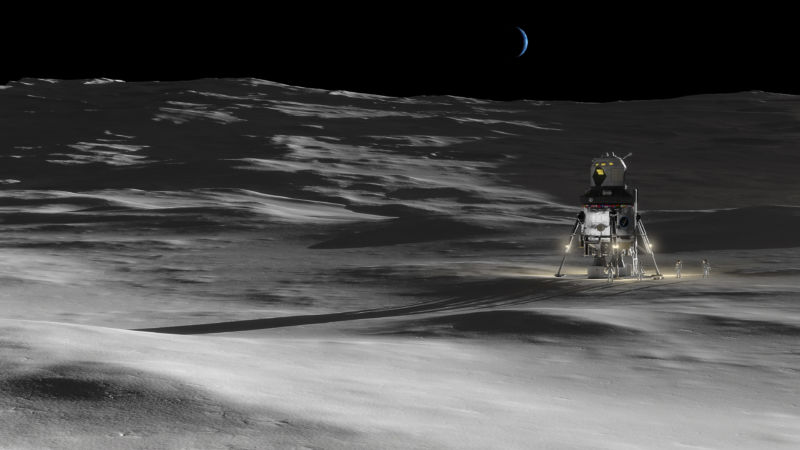
NASA is moving ahead with plans to bring competition into the development of landers for its Artemis Moon program. This week, the space agency said it had selected five US companies to conduct additional work toward refining lunar lander concepts to take astronauts down to the Moon's surface later this decade.
The combined value of the fixed-price awards is $146 million, and the work is to be completed during the next 15 months. The winning companies are:
- Blue Origin Federation of Kent, Washington, $25.6 million
- Dynetics of Huntsville, Alabama, $40.8 million
- Lockheed Martin of Littleton, Colorado, $35.2 million
- Northrop Grumman of Dulles, Virginia, $34.8 million
- SpaceX of Hawthorne, California, $9.4 million
According to NASA, each of these companies will further develop lander design concepts and evaluate the landers' performance, design, mission assurance requirements, and more. The companies will also mitigate lunar lander risks by conducting critical component tests and advancing the maturity of key technologies.
“Establishing a long-term human presence on the Moon through recurring services using lunar landers is a major Artemis goal,” said Kathy Lueders, NASA’s chief of human spaceflight, in a statement. “This critical step lays the foundation for US leadership in learning more about the Moon and for learning how to live and work in deep space for future missions farther into the Solar System.”
The awards come about five months after NASA selected SpaceX to refine its Starship vehicle for a demonstration Moon landing and a subsequent crew landing on the Moon. NASA had hoped to fund two providers in April, but Congress only appropriated one-quarter of the amount of money NASA sought. So SpaceX received the total value of $2.89 billion over five years.
To retain a competitive environment, NASA said it would move to procure "recurring landing services" from American companies. This contract will be for operational missions to the lunar surface following SpaceX's demonstration missions. The space agency said the awards announced this week would "ultimately help shape the strategy and requirements for a future NASA's solicitation to provide regular astronaut transportation from lunar orbit to the surface of the Moon." The amount of those future "recurring services" awards will be determined by Congressional appropriations.
After the SpaceX award in April, the other two finalists for a lunar lander contract, the Blue Origin-led National Team and Dynetics, protested to the US Government Accountability Office. That protest was denied, and Blue Origin has since sued NASA in the US Court of Federal Claims to overturn the awards. The dispute is pending.
Blue Origin and two other National Team members—Lockheed Martin and Northrop Grumman—were among the winners of the new, smaller awards this week. One of these companies, Northrop Grumman, said it remained committed to the National Team but was also keeping its options open.
“We continue to work in partnership with Blue Origin and the National Team to meet NASA’s ambitious goals to return to the Moon and Mars," said Steve Krein, vice president of Civil and Commercial Satellites for Northrop Grumman. "In addition to those collective efforts, we are also providing our unique skills and capabilities to exploring alternative perspectives for a long-term sustainable program to take humans back to the Moon to stay.”
A source confirmed that the National Team is likely to stay together as long as there is a chance to win the original contract, awarded solely to SpaceX. But if that challenge is unsuccessful, the individual members of the National Team are preparing to go their own ways. The 15-month period will provide time to review their options.
reader comments
207